Unit 3 Family matters Using language 语法 课件(共26张PPT)-2025-2026学年外研版(2019)必修第一册
文档属性
| 名称 | Unit 3 Family matters Using language 语法 课件(共26张PPT)-2025-2026学年外研版(2019)必修第一册 | 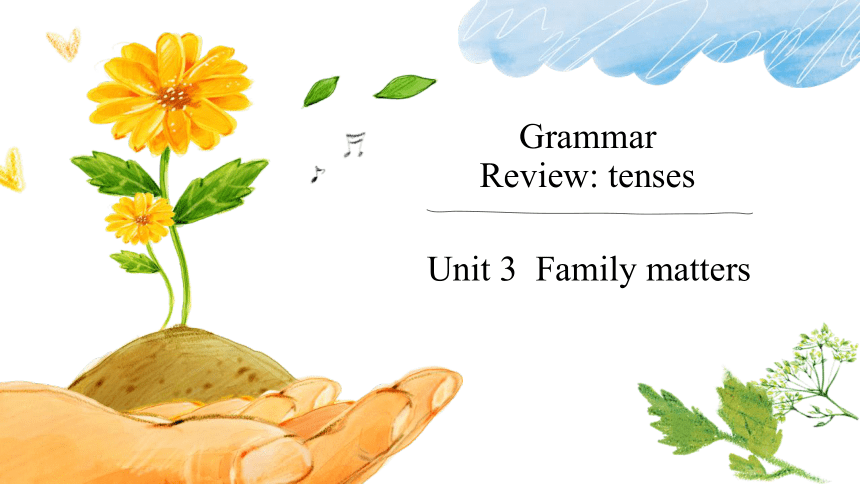 | |
| 格式 | pptx | ||
| 文件大小 | 23.4MB | ||
| 资源类型 | 教案 | ||
| 版本资源 | 外研版(2019) | ||
| 科目 | 英语 | ||
| 更新时间 | 2025-07-17 11:28:19 | ||
图片预览

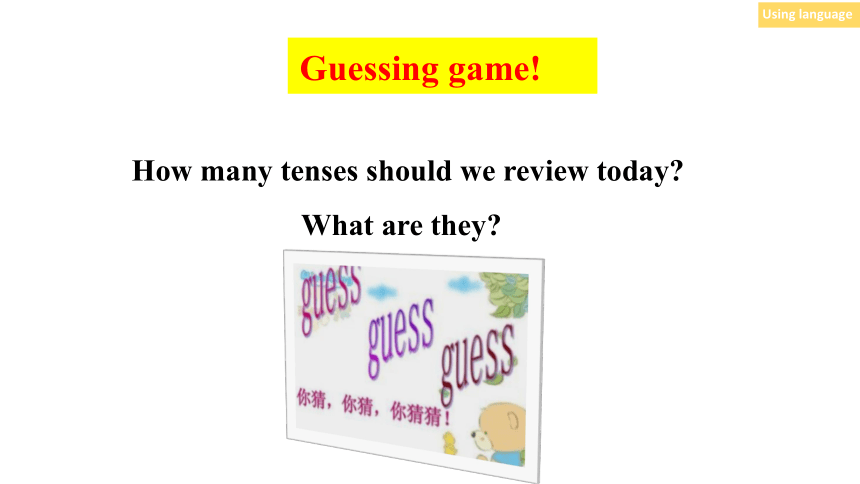
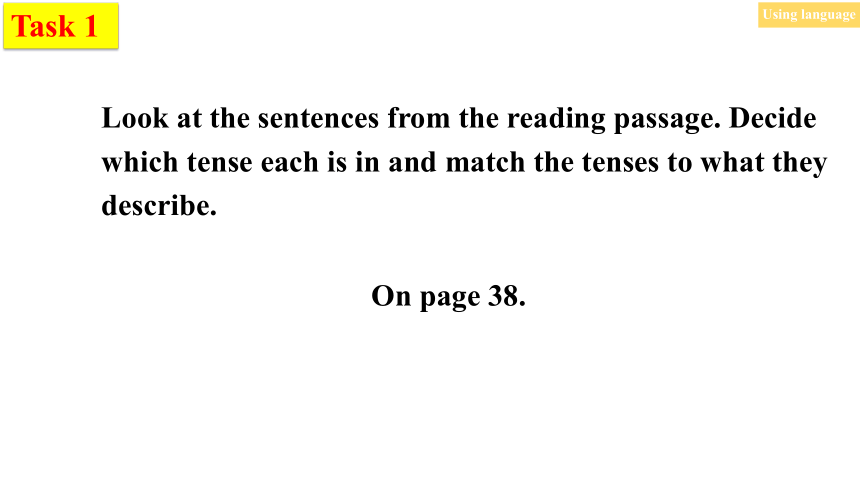
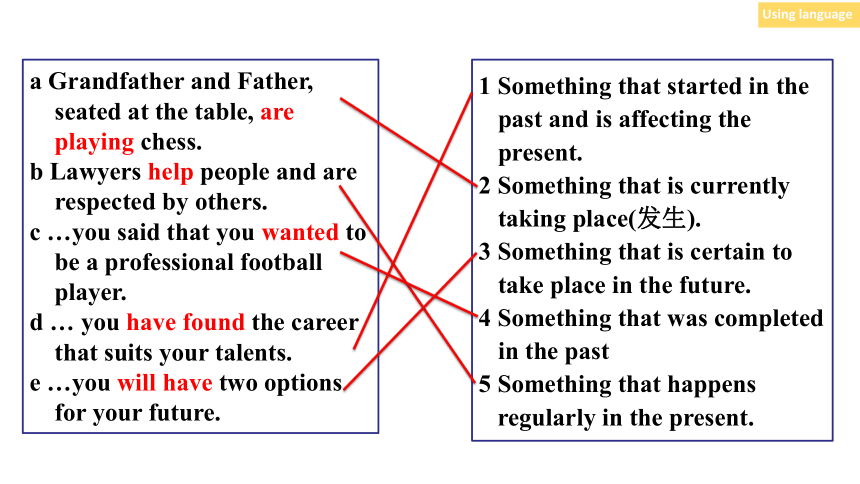
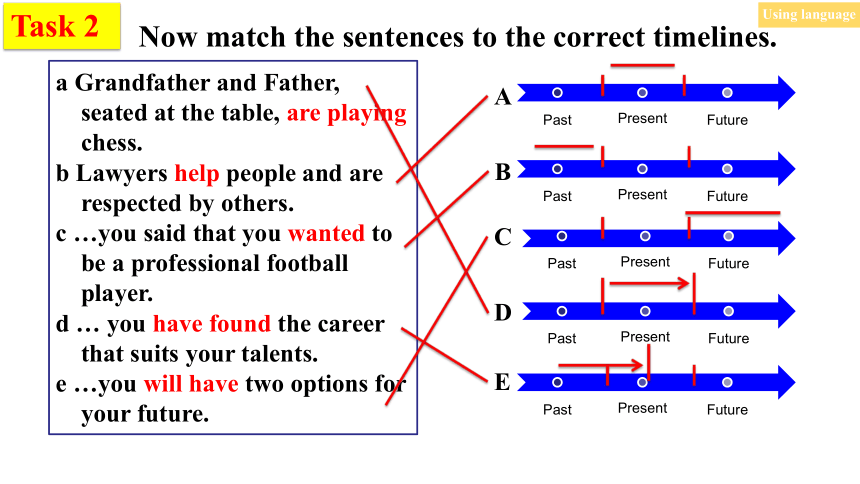
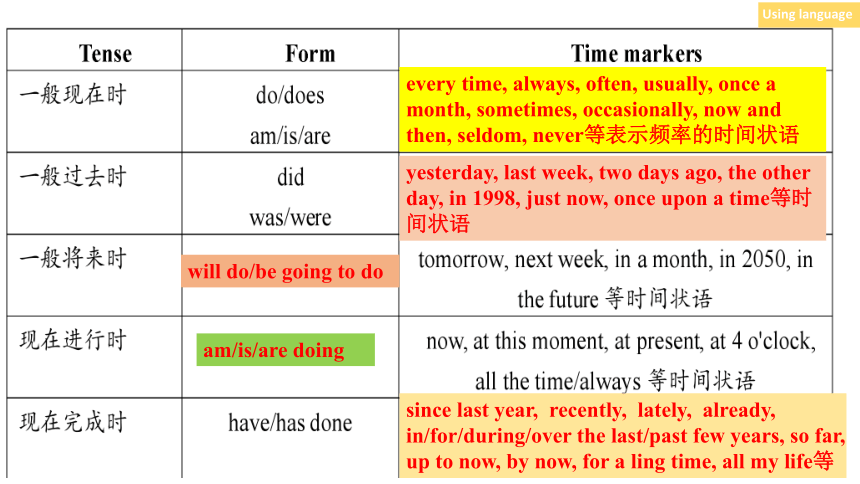
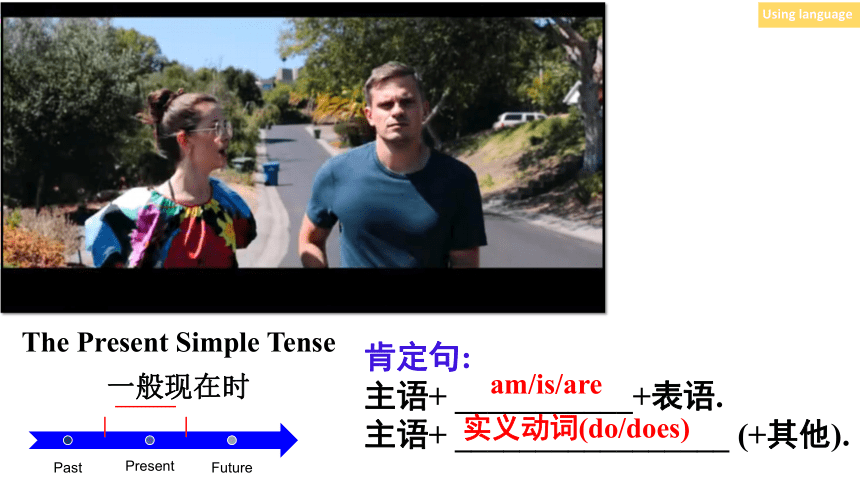
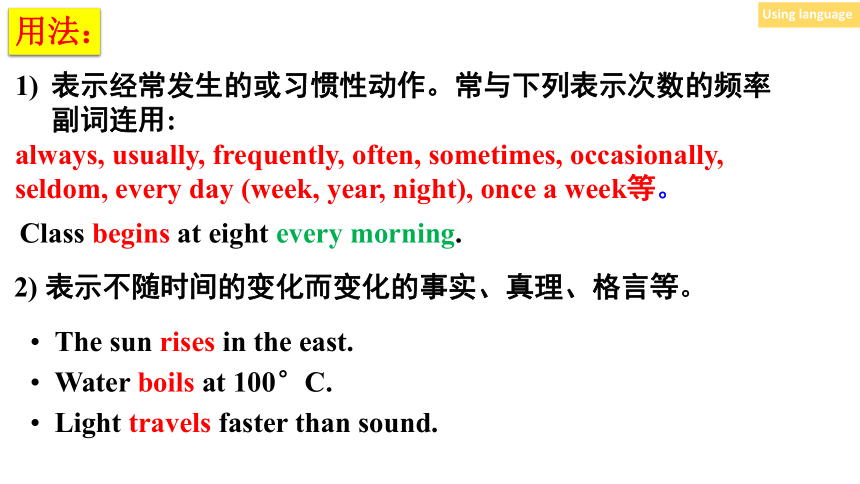
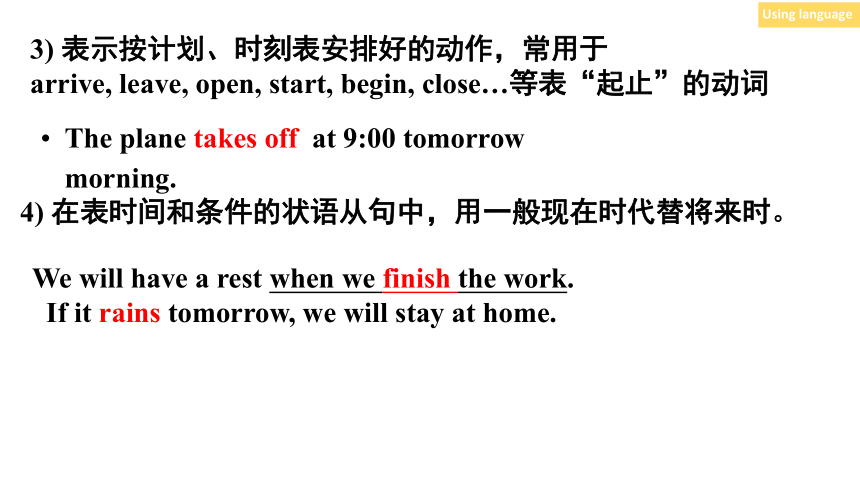
文档简介
(共26张PPT)
Unit 3 Family matters
Grammar
Review: tenses
How many tenses should we review today
What are they
Guessing game!
Using language
Look at the sentences from the reading passage. Decide which tense each is in and match the tenses to what they describe.
On page 38.
Task 1
Using language
a Grandfather and Father, seated at the table, are playing chess.
b Lawyers help people and are respected by others.
c …you said that you wanted to be a professional football player.
d … you have found the career that suits your talents.
e …you will have two options for your future.
1 Something that started in the past and is affecting the present.
2 Something that is currently taking place(发生).
3 Something that is certain to take place in the future.
4 Something that was completed in the past
5 Something that happens
regularly in the present.
Using language
a Grandfather and Father, seated at the table, are playing chess.
b Lawyers help people and are respected by others.
c …you said that you wanted to be a professional football player.
d … you have found the career that suits your talents.
e …you will have two options for your future.
A
B
C
D
E
Using language
Now match the sentences to the correct timelines.
Task 2
every time, always, often, usually, once a month, sometimes, occasionally, now and then, seldom, never等表示频率的时间状语
yesterday, last week, two days ago, the other day, in 1998, just now, once upon a time等时间状语
will do/be going to do
am/is/are doing
since last year, recently, lately, already, in/for/during/over the last/past few years, so far, up to now, by now, for a ling time, all my life等
Using language
The Present Simple Tense
一般现在时
Using language
肯定句:
主语+ ___________+表语.
主语+ _________________ (+其他).
am/is/are
实义动词(do/does)
The sun rises in the east.
Water boils at 100°C.
Light travels faster than sound.
2) 表示不随时间的变化而变化的事实、真理、格言等。
用法:
表示经常发生的或习惯性动作。常与下列表示次数的频率副词连用:
always, usually, frequently, often, sometimes, occasionally, seldom, every day (week, year, night), once a week等。
Class begins at eight every morning.
Using language
The plane takes off at 9:00 tomorrow morning.
We will have a rest when we finish the work.
If it rains tomorrow, we will stay at home.
3) 表示按计划、时刻表安排好的动作,常用于
arrive, leave, open, start, begin, close…等表“起止”的动词
4) 在表时间和条件的状语从句中,用一般现在时代替将来时。
Using language
The Past Simple Tense
一般过去时
Using language
肯定句: 主语+ ___________+表语.
主语+ ___________ (+其他).
常见时间状语:
just now, yesterday, the day before yesterday, in the past, last night /week / month/year…, … ago, when+过去时
动词过去式
was/ were
1. 过去发生的动作或存在的状态。
He became a lawyer last year.
2. 表示过去某段时间持续的动作(现在不做了),常与表示时间段状语连用。
用法:
Using language
1. I lived in Beijing for five years.(我在北京住过5年。→ 现在已不在北京)
2. She worked in that company from 2010 to 2015.(她在2010-2015年期间在那家公司工作。→ 现已离职)
3.He studied French for two years, but he forgot most of it.(他学过两年法语,但现在基本忘了。)
The Future Simple Tense
一般将来时
Using language
主语 +__________ + 动词原形 + 其他.
will / shall
常见时间状语:soon, tonight, tomorrow,
next week/year, in the future,
in a month/year……, after……
1.Will you be free tonight
2.It’s fine today, let’s go to the park and have a picnic.
will /shall do 表示将要发生的动作或情况,
也可表示未事先考虑,临时决定将要做的事。
2) be going to: 有迹象表明要发生;
事先计划打算要做的事。
1. I’m going to visit my grandparents this weekend.
2.Look at the dark clouds, it’s going to rain.
用法:
Using language
① We’re to meet at 4:00 this afternoon.
② The shop is to open in May.
The meeting is about to begin.
4) be to do:表示约定、计划、安排要做的事。
3. be about to do:表示即将发生的动作。
(一般不与时间状语连用,但可与when从句连用)
I was about to fall asleep when the teacher called my name.
Using language
The Present Continuous Tense
现在进行时
Using language
主语+_________+ _________.
am/is/are
v-ing
1. He is watching a movie now.
2. Currently, they are doing experiments in the lab.
2) 表示目前一段时间内正在进行,但说话时可能没有进行,常带有this week, these days等时间状语。
表示说话时正在进行的,目前正在发生的动作。
时间状语: now, right now, at the (very) moment, at present, for the time being, currently……
用法:
Using language
1. I'm studying for the exam this week.
(这周我一直在备考。→ 说话时可能没在学,但近期持续进行)
2. She's writing a novel these days.
(她最近在写小说。→ 现阶段任务,但此刻不一定在写)
John is coming here next week and he is staying here until August.
3) 表示按计划或安排将要要发生的动作,常跟表将来的时间状语, 常用动词有:come, go, leave, arrive, return, stay等。
4)与always,all the time, often等连用,表经常反复的行为或某种感彩。
He is always forgetting his keys!
(他老是忘记带钥匙!→ 表达不满或无奈)
My boss is often changing his mind.
(我老板经常改变主意。→ 隐含抱怨)
Using language
The Present Perfect Tense
现在完成时
Using language
主语 + ________________+ 其他.
have / has + v-ed
时间状语:
lately, recently, already, yet(否定、疑问), for……,since……,ever since,
over the years, in recent years
up to now/ till now/ so far
in/over/during the past/last +时间段.
He has written eight books so far.
Up to now, I have understood everything the teacher’s said.
到目前为止,他已经写了八本书。
到目前为止,我已经理解了老师所说的一切。
In the last past 10 years, great changes have taken place in my hometown.
在过去的十年里,我的家乡发生了巨大的变化。
We have kept /have been keeping in touch with each other over the years.
这些年来我们一直保持着联系。
Using language
Look!Someone has broken the window.
有人把窗户打破了。(结果:窗户仍破着。)
1. 动作发生在过去, 强调对现在的结果、影响等。
2. 表示动作发生在过去, 并且一直持续到现在, 常有表示一段时间的时间状语。
1. He has taught in our school for 30 years.
2.My parents have been busy since last month.
用法:
Using language
It is the first time that I have had a formal western dinner.这是我第一次吃正式的西餐。
3. That/This/It is the first/second…/last time (that)…从句中要用现在完成时;
4. That/This/It is +the+形容词最高级+名词+(that)…从句中要用现在完成时;
This is the most exiting film I’ve ever seen, till now.
到目前为止,这是我看过的最精彩的电影。
It was the first time that I had had a formal western dinner.这是我第一次吃正式的西餐。
Using language
6. It is /has been +一段时间+since+一般过去时
It has been six years since we last saw each other, you know.
自从我们上次见面,已经过去6年了。
Using language
2.Complete the dialogue with the correct form of the words and expressions in brackets.
Dad: Adam, Sally, come here. Mum (1)______ (have) something to tell you.
Adam: Coming!
Sally: Coming!
Mum: I (2)______ (call) Grandma yesterday and invited her to our house this Sunday. We (3)______________________ (throw) her a big birthday party! So, we each need to choose a present.
has
called
will / are going to throw
Using language
Adam: I know — I (4)____________________(give) her a new tea set. She (5)______(like) drinking tea!
Mum: Good choice. What about you, Sally
Sally: I (6)______________(think of) making a scarf for her.
Mum: Good idea. I’m sure Grandma (7)________(love) it. Oh, (8)______ you (9)________(finish) the guest list yet, dear
Dad: Yes, I have, and I am working on the invitations.
Mum: OK. So we still need to prepare food and drinks. I’ll make a checklist.
am thinking of
will love
have
finished
will / am going to give
likes
Using language
Preparation Who is responsible Done Ongoing To do
choose presents for Grandma Everyone √
draw up the guest list on Wednesday Dad √
make invitations Dad √
prepare food and drinks on Sunday morning Mum √
They have decided to throw a birthday party to celebrate Grandma’s birthday…
3.Look at the checklist for Grandma’s birthday party and talk about the preparations. Use as many of the tenses in Activity 1 as possible.
Using language
They have decided to throw a birthday party to celebrate Grandma’s birthday. They have all chosen presents for Grandma. Dad drew up the guest list on Wednesday, and he is now making the invitations. Mum will prepare food and drinks for the party on Sunday morning.
Unit 3 Family matters
Grammar
Review: tenses
How many tenses should we review today
What are they
Guessing game!
Using language
Look at the sentences from the reading passage. Decide which tense each is in and match the tenses to what they describe.
On page 38.
Task 1
Using language
a Grandfather and Father, seated at the table, are playing chess.
b Lawyers help people and are respected by others.
c …you said that you wanted to be a professional football player.
d … you have found the career that suits your talents.
e …you will have two options for your future.
1 Something that started in the past and is affecting the present.
2 Something that is currently taking place(发生).
3 Something that is certain to take place in the future.
4 Something that was completed in the past
5 Something that happens
regularly in the present.
Using language
a Grandfather and Father, seated at the table, are playing chess.
b Lawyers help people and are respected by others.
c …you said that you wanted to be a professional football player.
d … you have found the career that suits your talents.
e …you will have two options for your future.
A
B
C
D
E
Using language
Now match the sentences to the correct timelines.
Task 2
every time, always, often, usually, once a month, sometimes, occasionally, now and then, seldom, never等表示频率的时间状语
yesterday, last week, two days ago, the other day, in 1998, just now, once upon a time等时间状语
will do/be going to do
am/is/are doing
since last year, recently, lately, already, in/for/during/over the last/past few years, so far, up to now, by now, for a ling time, all my life等
Using language
The Present Simple Tense
一般现在时
Using language
肯定句:
主语+ ___________+表语.
主语+ _________________ (+其他).
am/is/are
实义动词(do/does)
The sun rises in the east.
Water boils at 100°C.
Light travels faster than sound.
2) 表示不随时间的变化而变化的事实、真理、格言等。
用法:
表示经常发生的或习惯性动作。常与下列表示次数的频率副词连用:
always, usually, frequently, often, sometimes, occasionally, seldom, every day (week, year, night), once a week等。
Class begins at eight every morning.
Using language
The plane takes off at 9:00 tomorrow morning.
We will have a rest when we finish the work.
If it rains tomorrow, we will stay at home.
3) 表示按计划、时刻表安排好的动作,常用于
arrive, leave, open, start, begin, close…等表“起止”的动词
4) 在表时间和条件的状语从句中,用一般现在时代替将来时。
Using language
The Past Simple Tense
一般过去时
Using language
肯定句: 主语+ ___________+表语.
主语+ ___________ (+其他).
常见时间状语:
just now, yesterday, the day before yesterday, in the past, last night /week / month/year…, … ago, when+过去时
动词过去式
was/ were
1. 过去发生的动作或存在的状态。
He became a lawyer last year.
2. 表示过去某段时间持续的动作(现在不做了),常与表示时间段状语连用。
用法:
Using language
1. I lived in Beijing for five years.(我在北京住过5年。→ 现在已不在北京)
2. She worked in that company from 2010 to 2015.(她在2010-2015年期间在那家公司工作。→ 现已离职)
3.He studied French for two years, but he forgot most of it.(他学过两年法语,但现在基本忘了。)
The Future Simple Tense
一般将来时
Using language
主语 +__________ + 动词原形 + 其他.
will / shall
常见时间状语:soon, tonight, tomorrow,
next week/year, in the future,
in a month/year……, after……
1.Will you be free tonight
2.It’s fine today, let’s go to the park and have a picnic.
will /shall do 表示将要发生的动作或情况,
也可表示未事先考虑,临时决定将要做的事。
2) be going to: 有迹象表明要发生;
事先计划打算要做的事。
1. I’m going to visit my grandparents this weekend.
2.Look at the dark clouds, it’s going to rain.
用法:
Using language
① We’re to meet at 4:00 this afternoon.
② The shop is to open in May.
The meeting is about to begin.
4) be to do:表示约定、计划、安排要做的事。
3. be about to do:表示即将发生的动作。
(一般不与时间状语连用,但可与when从句连用)
I was about to fall asleep when the teacher called my name.
Using language
The Present Continuous Tense
现在进行时
Using language
主语+_________+ _________.
am/is/are
v-ing
1. He is watching a movie now.
2. Currently, they are doing experiments in the lab.
2) 表示目前一段时间内正在进行,但说话时可能没有进行,常带有this week, these days等时间状语。
表示说话时正在进行的,目前正在发生的动作。
时间状语: now, right now, at the (very) moment, at present, for the time being, currently……
用法:
Using language
1. I'm studying for the exam this week.
(这周我一直在备考。→ 说话时可能没在学,但近期持续进行)
2. She's writing a novel these days.
(她最近在写小说。→ 现阶段任务,但此刻不一定在写)
John is coming here next week and he is staying here until August.
3) 表示按计划或安排将要要发生的动作,常跟表将来的时间状语, 常用动词有:come, go, leave, arrive, return, stay等。
4)与always,all the time, often等连用,表经常反复的行为或某种感彩。
He is always forgetting his keys!
(他老是忘记带钥匙!→ 表达不满或无奈)
My boss is often changing his mind.
(我老板经常改变主意。→ 隐含抱怨)
Using language
The Present Perfect Tense
现在完成时
Using language
主语 + ________________+ 其他.
have / has + v-ed
时间状语:
lately, recently, already, yet(否定、疑问), for……,since……,ever since,
over the years, in recent years
up to now/ till now/ so far
in/over/during the past/last +时间段.
He has written eight books so far.
Up to now, I have understood everything the teacher’s said.
到目前为止,他已经写了八本书。
到目前为止,我已经理解了老师所说的一切。
In the last past 10 years, great changes have taken place in my hometown.
在过去的十年里,我的家乡发生了巨大的变化。
We have kept /have been keeping in touch with each other over the years.
这些年来我们一直保持着联系。
Using language
Look!Someone has broken the window.
有人把窗户打破了。(结果:窗户仍破着。)
1. 动作发生在过去, 强调对现在的结果、影响等。
2. 表示动作发生在过去, 并且一直持续到现在, 常有表示一段时间的时间状语。
1. He has taught in our school for 30 years.
2.My parents have been busy since last month.
用法:
Using language
It is the first time that I have had a formal western dinner.这是我第一次吃正式的西餐。
3. That/This/It is the first/second…/last time (that)…从句中要用现在完成时;
4. That/This/It is +the+形容词最高级+名词+(that)…从句中要用现在完成时;
This is the most exiting film I’ve ever seen, till now.
到目前为止,这是我看过的最精彩的电影。
It was the first time that I had had a formal western dinner.这是我第一次吃正式的西餐。
Using language
6. It is /has been +一段时间+since+一般过去时
It has been six years since we last saw each other, you know.
自从我们上次见面,已经过去6年了。
Using language
2.Complete the dialogue with the correct form of the words and expressions in brackets.
Dad: Adam, Sally, come here. Mum (1)______ (have) something to tell you.
Adam: Coming!
Sally: Coming!
Mum: I (2)______ (call) Grandma yesterday and invited her to our house this Sunday. We (3)______________________ (throw) her a big birthday party! So, we each need to choose a present.
has
called
will / are going to throw
Using language
Adam: I know — I (4)____________________(give) her a new tea set. She (5)______(like) drinking tea!
Mum: Good choice. What about you, Sally
Sally: I (6)______________(think of) making a scarf for her.
Mum: Good idea. I’m sure Grandma (7)________(love) it. Oh, (8)______ you (9)________(finish) the guest list yet, dear
Dad: Yes, I have, and I am working on the invitations.
Mum: OK. So we still need to prepare food and drinks. I’ll make a checklist.
am thinking of
will love
have
finished
will / am going to give
likes
Using language
Preparation Who is responsible Done Ongoing To do
choose presents for Grandma Everyone √
draw up the guest list on Wednesday Dad √
make invitations Dad √
prepare food and drinks on Sunday morning Mum √
They have decided to throw a birthday party to celebrate Grandma’s birthday…
3.Look at the checklist for Grandma’s birthday party and talk about the preparations. Use as many of the tenses in Activity 1 as possible.
Using language
They have decided to throw a birthday party to celebrate Grandma’s birthday. They have all chosen presents for Grandma. Dad drew up the guest list on Wednesday, and he is now making the invitations. Mum will prepare food and drinks for the party on Sunday morning.
